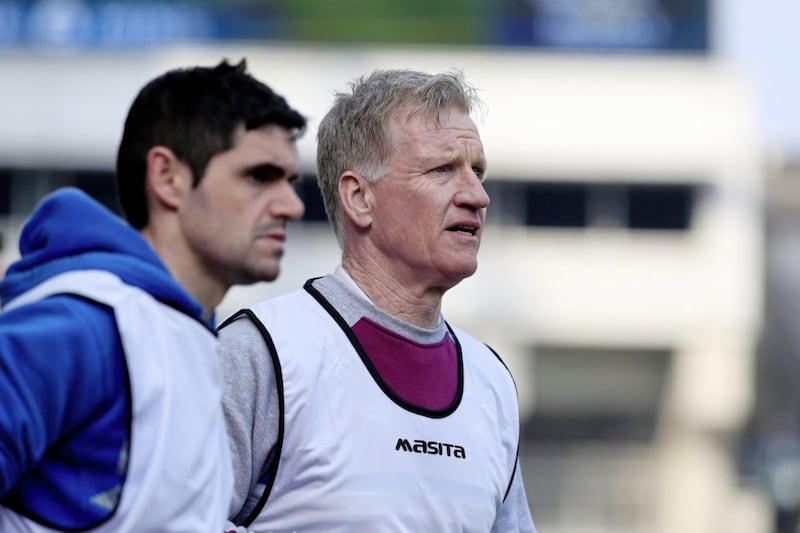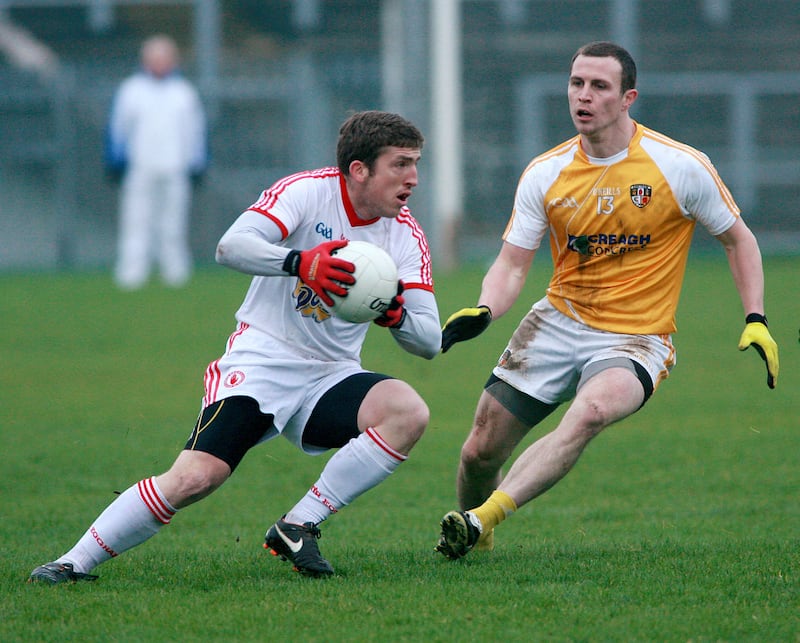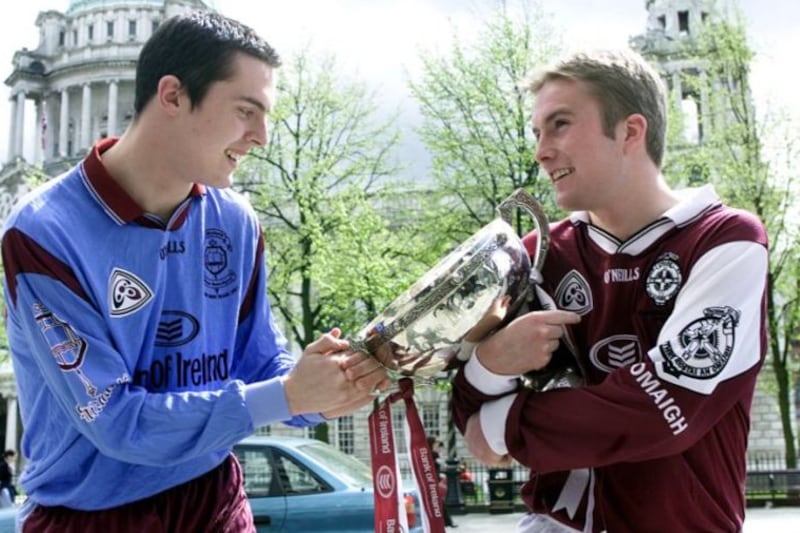LIKE so many people, Shaun Doherty is having to think creatively about what way to work over the next couple of weeks. As Fermanagh GAA’s football co-ordinator, he is in and out of secondary schools across the county on a daily basis.
That’s in normal circumstances. As it is, Doherty and his colleagues are working remotely where possible.
“We’re doing a wee bit of planning,” he says with a nervous laugh.
“We’ll spend time looking at content to add to the website; videos, drill design... it’s tough. It’s unchartered waters for everybody.”
That last statement is partially true as, in a sporting context, Doherty is part of a select group who well remember having their dreams left in disarray by the outbreak of a dangerous disease.
It was confirmed last Thursday that GAA activity at all levels had been suspended until March 29 in a bid to stem the spread of the coronavirus. The MacRory Cup final, scheduled to take place at the Athletic Grounds in Armagh today, was one of the many casualties.
When – if - it will eventually be played remains up in the air, leaving the players of St Colman’s College, Newry and St Patrick’s Grammar, Maghera with nothing else to do but wait, and hope.
It is not the first time the MacRory hasn’t been decided though; it’s not even the first time this Millennium.
Nineteen years ago Doherty was part of the St Michael’s College, Enniskillen team that went head to head with Omagh CBS in the 2001 decider, the Fermanagh men battling back to snatch a draw at the death.
That final had eventually taken place on April 2, 2001 – over a fortnight on from its traditional St Patrick’s Day date after the chaos caused by the foot and mouth outbreak across the UK and Ireland.
But the replay, slated for April 14, never took place.
Talking about planning and drill designs all sounds a bit grown up when Doherty considers what was swirling around his 17-year-old head in the lead up to the biggest game of his young life.
“We lived in a border area, so you nearly got used to getting off buses to wipe your feet. You didn’t really have a care in the world – unless it was football you didn’t really think about it.
“I came to the school from St Aidan’s that year and, to be honest, we probably didn’t think we’d get to the final. St Michael’s had won the MacRory in ’99 and then got to the final in 2000, but a lot of those boys weren’t there in ’01.
“We were made up of a lot of lower sixth players. There was maybe six or seven starters who came in from other schools, the likes of myself, James Sherry, Ciaran O’Reilly, but we worked extremely hard and ended up getting a great wee squad together.”
The semi-finals took place back-to-back at Casement Park, with St Michael’s leaving the field in confident mood after easing away from Abbey CBS.
Showered and dressed, they came back out to watch a talented Omagh side containing the likes of future Tyrone All-Ireland winners Dermot Carlin and Joe McMahon outclass St Colman’s.
“We were on first, and maybe that enthusiasm we had started to wane a wee bit when we saw Mark Donnelly, Joe McMahon, Jude Hans, Dermy Carlin, Aidan McCarron - they were all stars back then.
“But then you always had that man Corrigan behind you...”
Dominic Corrigan, a brilliant forward with the Erne County in his playing heyday, was demonstrating that it wasn’t only on the field where he could pull a rabbit from a hat.
Almost two decades on he remains the driving force behind the incredible St Michael’s success story, leading the Enniskillen school to MacRory and Hogan Cup titles last year.
“No matter what, Dom’s always going to get into your head,” says Doherty of his fellow Kinawley man.
“When you had him, there was nothing that could faze you. Dom would always have this great way of turning every negative into a positive.
“When the final was initially delayed, he had us believing we wouldn’t have been ready for that final if it had been played earlier, especially coming off the back of a big result – that we needed those extra weeks.
“The psychological warfare had begun.”
The week before the final, Corrigan hired a bus and drove the squad up to Belfast himself so they could reacquaint themselves with Casement before the big day.
First they went up to St John’s on the Whiterock Road to see where they would be doing their warm-up ahead of the final, then back to the famous old ground for a reccy of the changing rooms and pitch.
This is the point that’s supposed to describe how St Michael’s, so at ease with their surroundings, came flying out of the traps. Despite Corrigan’s best laid plans, however, the opposite occurred.
“There were so many lads who wouldn’t have been used to that kind of final atmosphere, we just didn’t get firing at all,” says Doherty.
Inspired by Aidan McCarron – who would later represent Tyrone and his adopted Fermanagh at senior county level – Omagh enjoyed purple patches either side of half-time to move five clear.
But back came St Michael’s late on to pull a draw from the wreckage, giving themselves a shot at another day.
“We regrouped at half-time.
“Myself and Paul Gunn ended up going out to midfield and it probably stabilised us a bit. Next thing there was a wee momentum change, we got a few scores on the board, started winning a lot of Omagh’s kick-outs...”
“They just reeled us in,” recalls Carlin, part of the Brothers’ full-back line that day.
“We missed frees, we missed chances. We had frees from 45 yards and we were taking them on where, with the benefit of hindsight, we should probably have been playing them short, playing ones-twos because we were moving the ball well.
“It was probably smart from St Michael’s fouling us outside the scoring zone and making us kick from there.
“It was a game we felt we left behind us and we were really looking forward to getting a crack at them again, to try and put a performance together for the full game.”
Hours after both teams headed back up the road, the replay date was set for Saturday, April 14. The Ulster U21 Championship schedule had also been upended by foot and mouth, with the final still outstanding as a result.
St Michael’s v Omagh CBS part two, Fermanagh U21s – also managed by Dominic Corrigan – versus Mickey Harte’s Tyrone. A double-header at Casement made all the sense in the world as a big occasion just got even bigger.
***************

FOURTEEN buses were due to leave St Michael’s that morning. Every one of the 20 clubs in the county would fill one as well. Two more, carrying past pupils and exiles, were ready to come up the road from Dublin.
Something out of the ordinary was brewing.
“This was going to be the most special day in Fermanagh GAA history for a long time,” recalls Corrigan.
“We were going to empty out the county – Fermanagh was going en masse to Casement Park. As somebody said to me at the time, metaphorically, Fermanagh were going to wage war on Tyrone that day.
“I knew a lot of the players form the ’99 MacRory team so that’s how I ended up taking on the U21 job. It was busy, but I was in my mid-30s then and like most young coaches, I was bulletproof.
“I just thought it was brilliant and both teams were convinced, I was convinced, that we were coming back down the road with the two cups that day...”
Late on Friday the 13th, fittingly, word started to filter through - a case of foot and mouth disease had been discovered at a farm near Ardboe.
The dreaded confirmation came late on via a statement from agriculture minister Brid Rodgers, leaving officials from both counties scrambling to spread the word before the following day’s planned exodus.
“It was a horrible, horrible anticlimax,” says Corrigan.
“Most of our players weren’t aware of it until the morning of the match. The lines of communication, mobile phones and all that, weren’t where they are now. You can imagine the logistical nightmare that was left.
“There were no WhatsApp group messages so it wasn’t as easy to let everybody know. It was a case of contact every house and home. I can recall now young first and second years coming up the avenue for their buses at 10am on the Saturday morning, unaware.”
With the calendar unable to accommodate another slot for the MacRory final, the Ulster Colleges’ Council agreed – five days after the ill-fated replay date – to share the title between the two schools.
PRO John Rath explained they had even considered playing the MacRory final when exams were over, but it didn’t happen. As a result, he was left in possession of several thousand match programmes published before the game was cancelled at the eleventh hour.
On account of the foot and mouth incident having taken place in Tyrone, however, it was decided to send St Michael’s through to the semi-final of the Hogan Cup weeks later.
To this day, that remains a bone of contention – on both sides.
“That was a bummer,” says Dermot Carlin, who would later win a Tyrone championship under Dominic Corrigan’s stewardship with Killyclogher.
“I know it goes down in the records that we won a MacRory Cup but, in the eyes of the players, did we really? No. We should’ve won one the first day out, but I’m sure St Michael’s were thinking they only performed in the second half and that they would be better in the replay.”

“To be honest, as a group of players, we were upset,” explains Shaun Doherty.
“Myself and a number of players would’ve felt it was no way to go on and represent Ulster. Give me that day back again and you’d rather it had gone to extra-time or finished on the day by whatever means.
“It was outside our control but it just didn’t feel right. You’d have rather gone on to represent Ulster being the provincial winner. Omagh were no different than ourselves, they had given up time and put in a lot of effort too.”
For Corrigan, it was double disappointment. St Michael’s would lose out in the Hogan Cup semi-final, going down by a point to Galway kingpins St Jarlath’s on April 29, 2001.
Later that summer, a Tyrone U21 side containing Cormac McAnallen, Owen Mulligan, Conor Gormley, Kevin Hughes, Philly Jordan, Brian McGuigan, Pascal McConnell, Enda McGinley and Stephen O’Neill would hoist aloft the Tom Markham Cup, defeating Mayo in the All-Ireland final.
The Ulster final eventually took place on May 26, six weeks after it had been scheduled.
“That was the disappointing thing for me,” says Corrigan.
“Our boys were flying. We’d beat a fancied Derry team up in Ballinascreen, Cavan in Brewster Park. You had the likes of Martin McGrath, Barry Owens, Shane McCabe, Colm Bradley... we had great momentum and confidence. We believed we were going to beat Tyrone in that Ulster final.
“By the time the final was eventually played a lot of our boys were away to America, so it wasn’t the Fermanagh team that would have lined out on April 14.”
Despite inflicting defeat on them that day, Mickey Harte did play a major part in an Erne County success last year as St Michael’s prepared to face Naas CBS in the Hogan Cup final.
“I asked him to come in the Wednesday before, and he gave a brilliant talk which I felt had a massive impact on the players,” says Corrigan.
“It gave us that wee edge to go on and win, I really believe that, so I’d always be grateful to Mickey.”
In 2002, St Michael’s and Omagh CBS made it back to the MacRory Cup final. With largely the same panels involved, the narrative surrounding the game had already been written.
Both felt slighted in their own way by the fallout from the unfinished business of 12 months previous. The Enniskillen school made sure there were no question marks this time, man-of-the-match Doherty helping inspire a seven point victory.
“You would’ve always got the vibe Omagh felt hard done by; this feeling that they were superior, that they would’ve hammered us in a replay,” he said.
“That’s ultimately what drove us on the next year – ‘what are they basing this on?’ We had a bad day, now we’ll go out and show everyone. There were probably those who felt what St Michael’s had done wasn’t right but we wanted to put a few things to bed.
“The newspapers were all saying this was the replay of the final that never was, that this was going to settle the issue once and for all. When we heard that, we went out on the field like men on a mission – even though we were only children really.
“There was no way we were coming off that field beat and for the last 20 minutes there was no real atmosphere in the game – it was over as a contest.
“We celebrated like we’d won two MacRorys that night; that’s how much it meant to us.”
For now, the chance to create that kind of magic has been whipped away from the young men of St Colman’s and St Patrick’s.
But Doherty, now 36, hopes it is not an opportunity lost to inspire potential stars of the future.
“You have to feel for these cubs; it’s such a shame for them.
“I’m not even sure where my medals are now, but the memories are all there and that’s what really matters. In those formative years, it matters so much.
“It was the driving force for me wanting to go on and play county football, that noise, the singing, the crowd going mad on MacRory final day… it’s like a drug, and you chase that buzz again.
“From that Omagh team it drove the Joe McMahons, the Dermy Carlins on to bigger and better days, and it can be the same for these boys. Some things in life are far more important, as we’re seeing at the moment, but this period won’t last forever, and these boys will go again.
“Football doesn’t just stop.”


